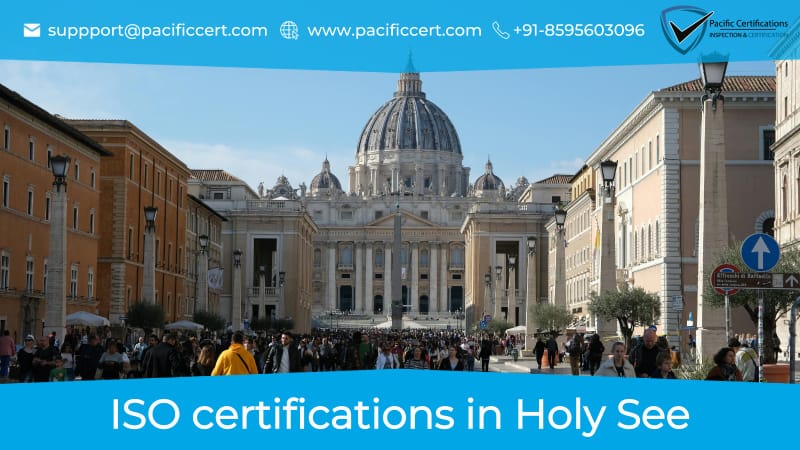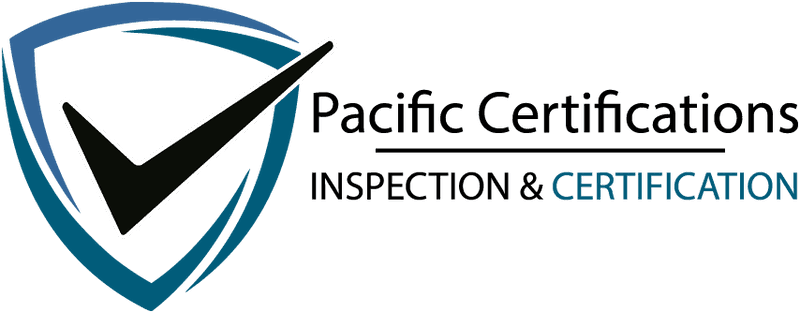ISO Certifications in Holy See, Popular Standards, Requirements and Benefits

ISO standards are essential for organizations aiming to enhance customer satisfaction, streamline processes, and comply with international regulations.
Quick Summary
The article explains how organisations operating within the Holy See can benefit from adopting internationally recognised ISO standards. Despite its unique governance structure, institutions in Vatican City rely on strong quality, security and operational systems. ISO certifications such as ISO 9001, ISO/IEC 27001, ISO 14001 and ISO 45001 help formalise processes, protect sensitive information, improve environmental practices and support safe workplaces. Pacific Certifications provides audit and certification services to help organisations meet these global standards.
In the Holy See, organizations across various sectors can benefit from a range of ISO standards. Some of the most relevant and widely implemented ISO standards include:
ISO 9001:2015 - Quality Management Systems (QMS): This standard focuses on enhancing customer satisfaction through effective quality management practices.
ISO 14001:2015 - Environmental Management Systems (EnMS): Aimed at helping organizations improve their environmental performance and comply with environmental regulations.
ISO 45001:2018 - Occupational Health and Safety Management Systems (OHSMS): Designed to ensure a safe and healthy workplace for employees.
ISO 27001:2012 - Information Security Management Systems (ISMS): Provides a framework for managing sensitive company information to ensure data security.
ISO 22000:2018 - Food Safety Management Systems (FSMS): Applicable to organizations involved in the food supply chain to ensure food safety.
ISO 50001:2018 - Energy Management Systems (EMS): Helps organizations improve their energy performance, reduce energy costs, and enhance sustainability.
Click here to find out more applicable standards to your industry
How we can help
At Pacific Certifications, we specialize in providing comprehensive audit and certification services to organizations in the Holy See. Our expertise and dedication ensure a seamless and efficient certification process.
Our Services Include
Pre-assessment Audits: We perform pre-assessment audits to evaluate your readiness for the certification audit and provide recommendations for improvement.
Certification Audits: Our accredited auditors conduct the final certification audit to ensure compliance with the chosen ISO standard.
Surveillance Audits: Post-certification, we conduct periodic surveillance audits to ensure ongoing compliance and continuous improvement.
Ready to achieve ISO certification for your organization in the Holy See?
Contact us today at [email protected] to learn more about our services and how we can assist you in the certification process!
Requirements of ISO Certifications in Holy See
ISO certifications in the Holy See are similar to those in other parts of the world, adhering to the global standards set by the International Organization for Standardization (ISO). Below are the key requirements for some of the most commonly pursued ISO certifications:
ISO 9001:2015 - Quality Management Systems (QMS)
Requirements:
Context of the Organization: Understand the internal and external factors affecting the organization and identify interested parties.
Leadership: Commitment from top management to develop and improve the QMS, including defining roles, responsibilities, and authorities.
Planning: Risk management, setting quality objectives, and planning changes.
Support: Adequate resources, competence, awareness, communication, and documented information.
Operation: Planning and control of operations, including requirements for products and services, design and development, control of external providers, production, and service provision.
Performance Evaluation: Monitoring, measurement, analysis, evaluation, internal audits, and management reviews.
Improvement: Addressing non-conformities, continual improvement, and corrective actions.
ISO 14001:2015 - Environmental Management Systems (EMS)
Requirements:
Context of the Organization: Identify environmental aspects and impacts, compliance obligations, and interested parties.
Leadership: Environmental policy, roles, responsibilities, and top management commitment.
Planning: Environmental objectives, risks, opportunities, and compliance obligations.
Support: Resources, competence, awareness, communication, and documented information.
Operation: Planning and control of processes that can impact the environment, emergency preparedness, and response.
Performance Evaluation: Monitoring, measurement, analysis, evaluation, internal audits, and management reviews.
Improvement: Nonconformities, corrective actions, and continual improvement.
ISO 45001:2018 - Occupational Health and Safety Management Systems (OHSMS)
Requirements:
Context of the Organization: Understanding internal and external issues, interested parties, and the scope of the OHSMS.
Leadership and Worker Participation: Leadership commitment, roles, responsibilities, consultation, and participation of workers.
Planning: Identifying hazards, risk assessment, legal requirements, and setting OHS objectives.
Support: Resources, competence, awareness, communication, and documented information.
Operation: Planning and control of processes to eliminate hazards, emergency preparedness, and response.
Performance Evaluation: Monitoring, measurement, analysis, evaluation, internal audits, and management reviews.
Improvement: Managing incidents, non-conformities, corrective actions, and continual improvement.
ISO 27001:2022 - Information Security Management Systems (ISMS)
Requirements:
Context of the Organization: Understanding the organization and its context, interested parties, and defining the scope of the ISMS.
Leadership: Leadership commitment, information security policy, roles, responsibilities, and authorities.
Planning: Risk assessment and treatment, information security objectives, and planning of changes.
Support: Resources, competence, awareness, communication, and documented information.
Operation: Planning and control of operations, risk treatment plans, and procedures for managing information security.
Performance Evaluation: Monitoring, measurement, analysis, evaluation, internal audits, and management reviews.
Improvement: Addressing nonconformities, corrective actions, and continual improvement.
ISO 22000:2018 - Food Safety Management Systems (FSMS)
Requirements:
Context of the Organization: Understanding internal and external factors, interested parties, and the scope of the FSMS.
Leadership: Top management commitment, food safety policy, roles, responsibilities, and authorities.
Planning: Setting food safety objectives, risk assessment, and planning for changes.
Support: Resources, competence, awareness, communication, and documented information.
Operation: Prerequisite programs (PRPs), hazard control plan, and control of operational processes.
Performance Evaluation: Monitoring, measurement, analysis, evaluation, internal audits, and management reviews.
Improvement: Managing non-conformities, corrective actions, and continual improvement.
ISO 50001:2018 - Energy Management Systems (EnMS)
Requirements:
Context of the Organization: Understanding internal and external issues, interested parties, and the scope of the EnMS.
Leadership: Top management commitment, energy policy, roles, responsibilities, and authorities.
Planning: Energy planning, setting objectives and targets, and planning actions to achieve them.
Support: Resources, competence, awareness, communication, and documented information.
Operation: Planning and control of processes related to energy performance, design, and procurement.
Performance Evaluation: Monitoring, measurement, analysis, evaluation, internal audits, and management reviews.
Improvement: Addressing nonconformities, corrective actions, and continual improvement.
For more information on how to achieve ISO certification in the Holy See, reach out to us at [email protected].
Benefits of ISO Certifications in Holy See
ISO certifications provide a myriad of benefits to organizations across the globe, including those in the Holy See. These internationally recognized standards help organizations improve their processes, meet regulatory requirements, and enhance their overall performance.
Below are some of the key benefits of obtaining ISO certifications in the Holy See:
Enhanced Credibility and Reputation
ISO certifications are globally recognized marks of quality and reliability. It demonstrates to customers, partners, and stakeholders that your organization is committed to maintaining high standards in its operations.
Improved Customer Satisfaction
ISO standards, such as ISO 9001:2015 for Quality Management Systems, focus on meeting customer requirements and enhancing customer satisfaction. By adhering to these standards, organizations can ensure that they consistently deliver high-quality products and services, leading to increased customer loyalty and satisfaction.
Operational Efficiency and Cost Savings
Implementing ISO standards helps organizations streamline their processes, reduce waste, and improve overall efficiency. For instance, ISO 14001:2015 for Environmental Management Systems can help organizations reduce their environmental impact and save costs through more efficient use of resources.
Compliance with Regulatory Requirements
ISO certifications help organizations stay compliant with local and international regulations. For example, ISO 45001:2018 for Occupational Health and Safety Management Systems ensures that organizations adhere to safety regulations, reducing the risk of legal penalties and enhancing workplace safety.
Risk Management
ISO standards emphasize risk-based thinking, which helps organizations identify and mitigate potential risks. This proactive approach to risk management can prevent issues before they occur, safeguarding the organization's assets and ensuring business continuity.
Enhanced Data Security
ISO 27001:2022 for Information Security Management Systems provides a robust framework for managing sensitive information and ensuring data security. This certification is particularly beneficial for organizations that handle confidential data, helping to protect against data breaches and cyber threats.
Market Expansion Opportunities
ISO certifications can open doors to new markets and business opportunities. Many international clients and partners prefer or require their suppliers to be ISO certified. Having these certifications can make your organization more competitive and attractive in the global marketplace.
Employee Engagement and Safety
Implementing standards like ISO 45001:2018 for Occupational Health and Safety Management Systems not only improves workplace safety but also boosts employee morale and engagement. Employees feel valued and secure when they know their organization prioritizes their health and safety.
Continual Improvement
ISO standards promote a culture of continual improvement. Organizations are encouraged to regularly review and improve their processes to maintain compliance with the standards. This ongoing commitment to improvement can lead to sustained growth and long-term success.
Sustainability and Environmental Responsibility
ISO 14001:2015 for Environmental Management Systems helps organizations reduce their environmental impact and promote sustainability. This certification demonstrates your organization's commitment to environmental stewardship, which can enhance your reputation and attract environmentally conscious customers.
Which industries need ISO Certifications in Holy See?
In the Holy See, several key industries can significantly benefit from obtaining ISO certifications. Here are some of the primary industries where ISO certifications are crucial:
Healthcare and Medical Services
ISO certifications help healthcare providers ensure high-quality patient care, improve safety protocols, and comply with regulatory requirements.
Education and Training
Educational institutions can use ISO certifications to enhance their management systems, ensure high educational standards, and improve student satisfaction.
Food and Beverage Industry
ISO certifications ensure food safety, quality control, and compliance with food safety regulations. They help organizations manage food safety hazards, implement best practices, and improve overall operational efficiency.
Information Technology and Data Security
In the IT sector, ISO certifications are vital for managing information security risks, protecting sensitive data, and ensuring the reliability and quality of IT services. These standards help in establishing robust security protocols and gaining customer trust.
Manufacturing and Production
Manufacturing industries benefit from ISO certifications by improving product quality, enhancing operational efficiency, reducing waste, and ensuring worker safety. These standards help manufacturers meet customer expectations and regulatory requirements.
Construction and Engineering
Construction and engineering firms use ISO certifications to improve project management, ensure safety compliance, and enhance environmental sustainability. These standards help in delivering high-quality construction projects while minimizing environmental impact.
Transportation and Logistics
ISO certifications help transportation and logistics companies improve service quality, ensure safety, and reduce environmental impact. These standards aid in optimizing logistics operations and enhancing customer satisfaction.
Tourism and Hospitality
In the tourism and hospitality sector, ISO certifications are crucial for maintaining high service standards, ensuring customer satisfaction, and promoting sustainable practices. These standards help businesses attract more customers and improve their market reputation.
Conclusion
By obtaining ISO certifications, organizations in these industries can enhance their credibility, improve operational efficiency, comply with regulatory requirements, and achieve sustained success and growth.
Pacific Certifications is accredited by ABIS, in case you need support with ISO certification for your business in Holy See, please contact us at [email protected] or +91-8595603096.
Read More at: Blogs by Pacific Certifications
